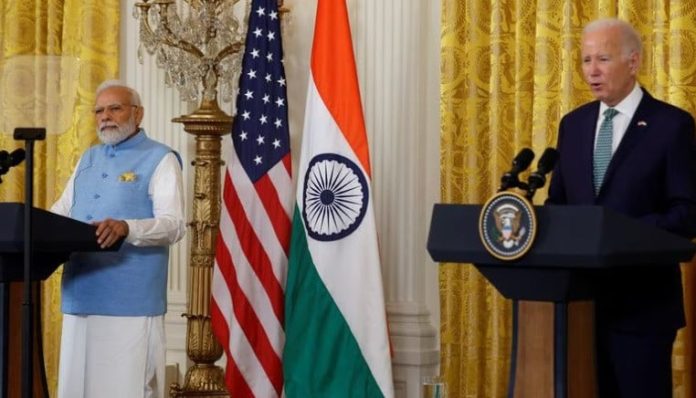Following a meeting at the White House between US President Joe Biden and visiting Indian Prime Minister Narendra Modi, Washington, and New Delhi released a joint statement accusing Pakistan of serving as a base for terrorist attacks, which Islamabad has denounced as “unwarranted”.
In a formal statement, Pakistan’s foreign ministry criticized the joint statement on Friday, insisting that it was “unwarranted, one-sided, and misleading” and that it violated diplomatic protocol by referring to Islamabad.
Islamabad also emphasized that New Delhi was using allegations of extremism against it in an effort to divert attention away from the oppressive conditions in the India-controlled, largely Muslim region of Kashmir as well as the unfair and discriminatory treatment of minorities throughout India.
By mentioning that it had maintained a “close counter-terrorism cooperation” with the United States, the ministry went on to express its surprise at the joint statement.
“They (Biden and Modi) strongly condemned cross-border terrorism, the use of terrorist proxies, and they urged Pakistan to take immediate steps to ensure that no territory under its control is used to carry out terrorist attacks,” the joint US-India statement proclaimed.
Relations between India and Pakistan have remained tense for many years. India and Pakistan have fought three wars since their separation from Britain in 1947, two of which were fought over Kashmir, a Himalayan region with a majority of Muslims that both countries fully claim but only partially control.
While Islamabad has vehemently denied the charge, New Delhi has long held Pakistan responsible for supporting militant attacks carried out in India, including the deadly 2008 attack in Mumbai that claimed more than 165 lives.
In addition, India asserts that Pakistan has supported militants opposing Indian forces in Kashmir since the late 1980s. Pakistan disputes the charge and maintains that all it does is support Kashmir’s predominately Muslim people as they struggle for freedom from India’s repressive nationalist Hindu government. Pakistan also claims that it only supports Kashmiris on a moral and diplomatic level.
After New Delhi was split into two federally controlled territories in 2019, the special status granted to the Indian state of Jammu and Kashmir was revoked. Pakistan declares such actions to be illegal and demands their cessation.
On Thursday, Modi received a red carpet welcome from Biden, who also praised the military and trade agreements they had made to thwart China’s growing influence. Additionally, Pakistan has stated its “deep concern” regarding the proposed transfer of cutting-edge US military technology to India, stating that such actions would not contribute to the establishment of peace in South Asia.
The Biden administration was urged to bring up Modi’s visit to Washington to address the ongoing human rights violations that continue to occur throughout India by dozens of US lawmakers on Tuesday.
In a letter to Biden, the American members of Congress stated that there were “a number of independent, credible reports reflecting troubling signs in India toward the narrowing of political space, the rise of religious intolerance, the targeting of civil society organizations and journalists, and growing restrictions on press freedoms and internet access.”.
In a letter to Biden, 75 Democratic senators and representatives emphasized the significance of human rights issues to “a successful, strong, and long-term relationship” between the two nations. They urged Biden to bring up these issues with Modi in their discussions.
The ultra-nationalist Modi arrived in New York on Tuesday amid worries about what is perceived to be a worsening human rights situation under his Hindu nationalist Bharatiya Janata Party (BJP).
However, since Washington wants to have closer ties with India, rights activists are concerned that geopolitics will overshadow human rights issues.
Since the right-wing Modi government took office in India, Muslims there have continued to be the targets of discriminatory laws and hate crimes committed by extreme Hindu groups.
The BJP government at the federal and state levels is accused by opposition parties of discriminating against religious minorities. In the eyes of his detractors, Modi’s victory in 2014 gave a boost to hard-line extremist groups that see India as a “Hindu nation” and its 200 million-strong Muslim minority as a foreign threat.













